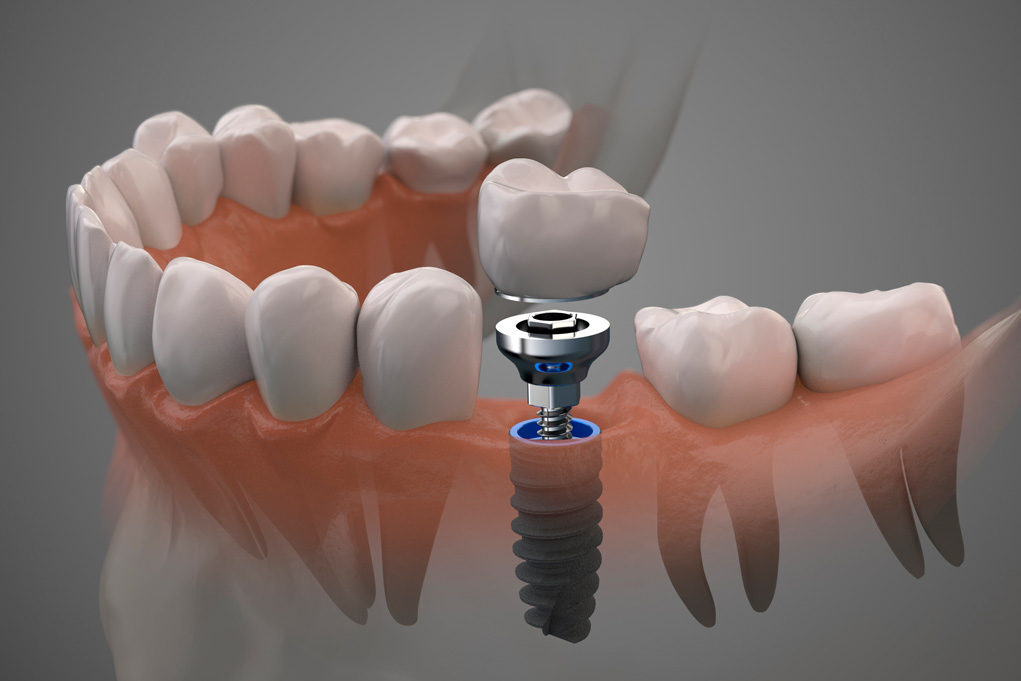
x
Dental implants have revolutionized the way we approach dental restoration, offering a permanent solution for missing teeth. They provide not only aesthetic benefits but also functional advantages, improving overall oral health. This guide will delve into the intricacies of dental implants, covering everything from the procedure itself to common questions and concerns.

Dental implants are artificial tooth roots made of titanium that are surgically inserted into the jawbone. They serve as a sturdy base for supporting one or more artificial teeth, known as crowns. Unlike dentures, which can be removed, implants are permanent fixtures in the mouth. Titanium is chosen for its biocompatibility, meaning it integrates well with human bone, ensuring long-term stability and functionality. This integration process, known as osseointegration, is a key factor in the success of dental implants.
Dental implants offer numerous benefits over traditional dentures and bridges:
There are several types of dental implants available, each suited to different patient needs:
Full mouth dental implants involve replacing all of the teeth in either the upper or lower jaw, or both. This procedure is suitable for individuals who have lost multiple teeth due to decay, injury, or other health issues. Full mouth implants can significantly enhance quality of life by restoring the ability to chew, speak, and smile confidently.
With advancements in dental technology, it is now possible to receive full dental implants in just one day. This process involves using immediate load implants that allow temporary crowns to be placed on the same day as surgery. The procedure typically involves a thorough evaluation, precise placement of implants, and the attachment of temporary prosthetics. Patients can leave the clinic with a functional and aesthetic smile, though final adjustments and permanent crowns may be placed in subsequent visits.
Many clinics offer special promotions or financing options to make dental implants more affordable. It’s important to research and choose a reputable clinic that provides quality care at a reasonable price. Some clinics may offer discounts for multiple procedures or payment plans to suit different financial situations.
Finding affordable full mouth dental implants can be challenging but not impossible. Many clinics offer payment plans or work with insurance companies to help cover costs. Additionally, some dental schools or training centers may provide reduced-cost services, though it’s important to ensure the quality of care provided.
When selecting a clinic for your dental implant procedure, consider these factors:
A1: Most patients experience minimal discomfort during and after the procedure due to anesthesia and pain management techniques. While some soreness or swelling may occur post-surgery, it is typically manageable with over-the-counter medications.
A2: Healing time varies but typically ranges from three to six months for osseointegration to occur fully. During this period, patients may experience some tenderness or sensitivity, but proper care and adherence to post-operative instructions can facilitate a smooth recovery.
A3: Ideal candidates have healthy gums and sufficient bone density; however, additional procedures like bone grafting can make more patients eligible. Even individuals with significant bone loss or medical conditions may be suitable for implants, provided they are in good overall health and committed to proper oral hygiene.
A4: Maintain good oral hygiene by brushing twice daily, flossing regularly, and visiting your dentist for routine check-ups. Avoid habits like grinding your teeth or using implants to open bottles, as these can compromise their integrity. Regular professional cleanings are essential to prevent plaque buildup and ensure the longevity of your implants.
A5: The success rate is approximately 95%, making them one of the most reliable options for tooth replacement. With proper care and maintenance, implants can last a lifetime, providing a durable and aesthetic solution to missing teeth.
For Spanish-speaking communities seeking affordable options, many clinics provide "implantes dentales economicos." These services aim to offer cost-effective solutions without compromising on quality. It’s important to inquire about payment plans, insurance coverage, and any ongoing promotions to find the best value for your investment in oral health.